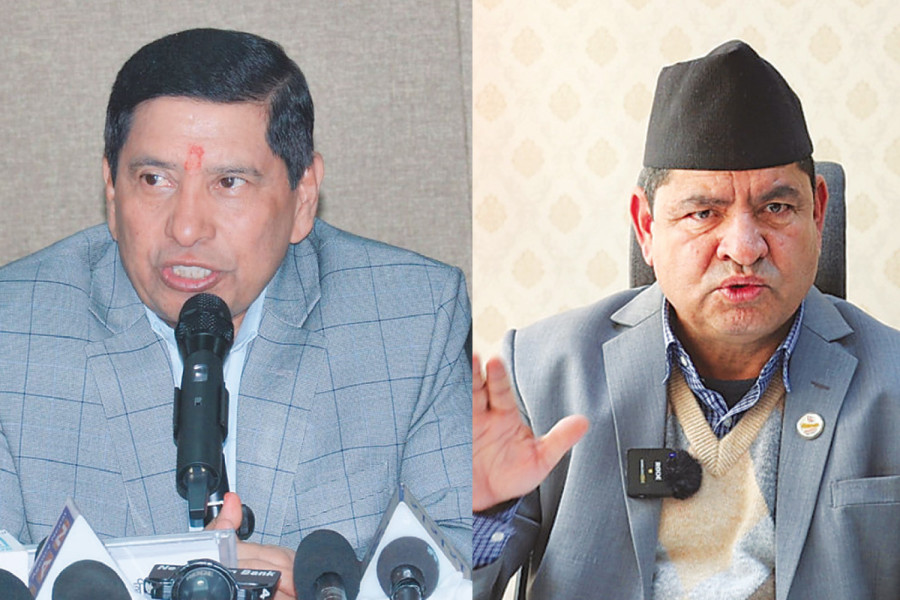National
Ministers trade blame over Balkumari deaths
Parliamentary committee urges investigation into transport minister Prakash Jwala and Labour Ministry.
Prithvi Man Shrestha
Minister for Physical Infrastructure and Transport Prakash Jwala is now at the centre of criticism after two youths aspiring to go to South Korea for employment were killed in clashes between police and protestors at Balkumari in Lalitpur on Friday.
When the youths who were earlier barred from applying for a Korean language test for manufacturing jobs in South Korea were protesting in front of the Employment Permit System (EPS) office at Balkumari that day, Jwala had reached the area in his car, triggering angry response from the protestors.
After the protestors confronted the minister and set his car on fire, police used force to disperse the crowd, sparking clashes between the two sides. In the ensuing turmoil, two youths—21-year old Birendra Shah from Achham and 23-year Sujan Raut from Dailekh—died with at least one from gunshot wounds.
The protesters were the youths who had earlier failed a language proficiency test for shipbuilding jobs in South Korea and wanted to sit another exam to be eligible for manufacturing jobs.
But they were barred from participating in the language test for manufacturing jobs citing a Korean government policy against entertaining applicants for another job in the same year.
The Balkumari incident triggered a heated debate at the State Affairs and Good Governance Committee under the House of Representatives on Monday.
Several lawmakers criticised Deputy Prime Minister and Home Minister Narayan Kaji Shrestha and Jwala for the tragic incident. Instead of taking responsibility, the two ministers engaged in blame games while defending themselves.
Deputy Prime Minister Shrestha said at the parliamentary committee that Jwala’s arrival at the protest site worked as a catalyst to fuel the fire in the protests.
“He had a PSO [personal security officer] and bodyguard from the Nepal Army. The PSO takes information about the status of route clearance and also listens to instructions issued from the (police) control room with a walkie talkie. Yet they took that route, raising questions about why the PSO didn’t prevent him [the minister] from taking that route. Anyway, this played a role of catalyst to take the situation to another (wrong) direction,” Shrestha said.
According to him, before the minister arrived, the police were attempting to prevent potential damage to the EPS office and had used canes and tear gas to disperse the protesters. “After Jwala argued with the protestors coming out from his vehicle, the protest turned ugly,” said Deputy Prime Minister Shrestha.
The EPS office is responsible for conducting Korean language proficiency tests for foreigners seeking jobs in South Korea.
Speaking at the parliamentary committee, lawmaker and Nepali Congress General Secretary Gagan Thapa blamed Jwala’s negligence for the deaths.
But talking to the Post, Jwala defended himself arguing that he had reached the incident site because security agencies had not notified him about the road obstruction by protesters. “Am I a fool to take the same route where there is an obstruction?” he said.
Nepal Police spokesman Deputy Inspector General of Police Kuber Kadayat said that it was the responsibility of the minister’s PSO to seek details about route clearance from the local police before the movement of the VIP.
“PSO does have communication equipment such as walkie talkie to communicate with the local police. The PSO overhears all the conversation between police officers regarding road status and s/he can also ask about it,” said Kadayat.
In a statement on December 30 last year, the home ministry said Deputy Superintendent of Police Umesh Lamsal of Lalitpur Police, who was on the field on the day of the incident, and Bodhraj Danuwar, personal security officer for Jwala, were suspended pending the report of the probe committee.
When asked whether his PSO sought information about road clearance, Jwala said he was unaware about it. “I was not informed about the disturbance on the road, so I chose to use the route to go to the ministry,” he said. “PSO is also a part of the country’s security system. It is the security agency that should shoulder responsibility.”
According to Jwala, he was returning to his ministry after participating in a meeting of his party, the CPN (Unified Socialist), in Lalitpur. After the protesters stopped his vehicle, he and his PSO attempted to convince the crowd to allow him to go ahead.
“Then my PSO sought assistance from the police mobilised there, but reinforcements didn’t arrive on time and I was stuck there for 20 minutes,” Jwala said. “Then, I returned to my party’s meeting again. I don’t know what happened after I left the protest site.”
Lawmakers were expressing disbelief that a minister would not know about the situation of the route as the VIP’s PSO is usually well-informed.
Nepali Congress lawmaker Thapa said he believed the minister’s pressure on the police to take the obstructed route led to the incident. “The PSO cannot defy politician’s certain orders. The carelessness of the minister led to the deaths,” Thapa said, questioning whether the probe committee would look into the minister’s role in the incident.
With Jwala facing questions for exacerbating the protests, the parliamentary committee has instructed the government to investigate both him and the Ministry of Labour, Employment and Social Security.
Following the incident, the labour ministry suspended Gurudutta Subedi, director at the EPS section of the Department of Foreign Employment. But lawmakers have expressed dissatisfaction with the action against junior government employees. “You have made scapegoats of lower-level government employees,” Rabi Lamichhane, chairperson of Rastriya Swatantra Party, told the parliamentary committee.




 18.12°C Kathmandu
18.12°C Kathmandu














